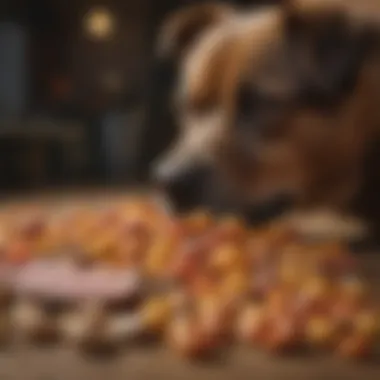Effective Strategies for Relieving Diarrhea in Dogs


Intro
Diarrhea in dogs is a common concern among pet owners. Understanding the underlying causes and effective strategies for relief is essential for maintaining your dog's health. Factors such as diet, stress, and infections can lead to this gastrointestinal issue. The aim of this article is to provide a thorough exploration of the strategies that can be employed to manage diarrhea in dogs effectively. By recognizing symptoms and implementing appropriate home care methods, you can ensure your pet's well-being.
Understanding Your Pet
Effective management of diarrhea begins with knowing your dog better. Awareness of breed traits, common temperaments, and special health needs can influence how they might handle gastrointestinal issues.
Breed Traits
Different dog breeds can have varying sensitivities to dietary changes and digestive disturbances. For instance, some small breeds like Dachshunds may experience diarrhea from stress or sudden dietary shifts more acutely than larger breeds. Familiarizing yourself with your dog’s specific breed characteristics can provide insights into their health needs and tendencies toward diarrhea.
Common Temperaments
A dog's temperament can play a critical role in their health. Nervous or anxious dogs may experience stress-related gastrointestinal symptoms. Understanding your pet's demeanor can pave the way for preventive measures. If your dog tends to get stressed easily, consider strategies to create a calmer environment.
Special Needs
Some dogs may have underlying health conditions or dietary restrictions that make them more susceptible to diarrhea. Conditions such as food allergies, inflammatory bowel disease, or pancreatitis can increase the likelihood of digestive issues. If your dog has special health needs, it's important to tailor their diet and care accordingly.
Pet Care Essentials
Proper care goes beyond merely addressing diarrhea. A holistic approach to pet care encompasses nutrition, grooming, and overall wellness, impacting your dog's digestive health.
Nutrition and Feeding Guidelines
A balanced diet is fundamental in maintaining digestive health. Provide high-quality dog food suited for your dog's age, size, and specific needs. Limit table scraps and ensure a gradual transition when changing diets to prevent digestive upset. Consider incorporating fiber-rich foods to aid digestion.
Grooming Tips and Techniques
While grooming does not directly affect gastrointestinal health, it ensures your dog remains clean and comfortable. Regular brushing can help remove loose hair that might be ingested, which can lead to gastrointestinal issues.
Health and Wellness
Routine health checks are crucial. Ensure your dog is vaccinated and receives regular vet examinations. Preventive care can help identify any potential issues before they escalate into serious problems that cause symptoms like diarrhea.
When to Seek Veterinary Help
Monitoring the duration and severity of your dog's diarrhea is vital. If diarrhea continues for more than two days, or is accompanied by symptoms such as vomiting, lethargy, or blood in the stool, you should consult a veterinarian. A professional assessment can rule out serious conditions and provide tailored treatment options.
“Proactive monitoring of your dog's health can prevent minor issues from becoming critical.”
Culmination
Addressing diarrhea in dogs requires a deep understanding of their overall health and specific needs. By recognizing the individual characteristics of your pet, you can create a comprehensive care strategy. This can include proper nutrition, hygiene, and timely veterinary intervention as needed. Through these methods, you can provide relief for your dog while promoting long-term health.
Understanding Dog Diarrhea
Understanding diarrhea in dogs is vital for any pet owner. This health issue can emerge suddenly and may impact your dog's overall well-being. Recognizing and addressing diarrhea promptly can prevent serious health complications. This section aims to enlighten readers on the nature of canine diarrhea, its potential causes, and the significance of monitoring symptoms closely.
What is Dog Diarrhea?
Diarrhea in dogs is characterized by unusually loose or watery stools. It's not a disease itself, but a symptom of an underlying issue. The condition can vary in severity, from mild and transient to a sign of something more serious. It is important for dog owners to differentiate between normal stool consistency and diarrhea. A day of soft stool might arise from dietary changes, while persistent diarrhea may indicate infection or other health concerns.


Common Causes of Diarrhea in Dogs
There are numerous factors that can lead to diarrhea in dogs. Here are some of the most common causes:
- Dietary indiscretion: When dogs eat something they shouldn’t, it can cause digestive upset.
- Food allergies: Some dogs may react adversely to certain ingredients in their food.
- Infections: Bacterial or viral infections can provoke diarrhea.
- Parasites: Worm infestations and other parasites can disrupt normal digestion.
- Stress or anxiety: Changes in environment or routine can lead to nervous stomachs.
Understanding these causes is essential. This knowledge helps pet owners make informed decisions about their dog's care.
Symptoms to Monitor
Monitoring symptoms related to diarrhea is crucial for proper treatment. Here are key signs that pet owners should observe:
- Frequency of stool: More than three loose stools in 24 hours may require intervention.
- Accompanying symptoms: Vomiting, lethargy, or loss of appetite can indicate a serious problem.
- Duration: If diarrhea persists longer than a day, professional advice may be needed.
It’s critical to remain vigilant and act promptly when these symptoms arise. Early intervention can prevent further complications and facilitate quicker recovery.
In summary, understanding dog diarrhea involves grasping its symptoms, causes, and implications. This foundational knowledge equips pet owners with the ability to address the issue effectively, ultimately promoting better health for their furry companions.
Immediate Home Remedies
Immediate home remedies play a critical role in addressing diarrhea in dogs. Quick and effective, these strategies form the first line of defense against this common ailment. While underlying issues may require veterinary attention, these remedies can alleviate discomfort and promote faster recovery.
Home remedies offer a safe and accessible approach for pet owners, allowing them to manage mild cases while keeping their dogs comfortable. Many of these simple strategies depend on home-based solutions, such as fasting, ensuring hydration, and modifying the diet to include bland foods. It is important for dog owners to remember that these remedies should be viewed as initial steps that help create a stable environment for recovery.
Fasting: A Temporary Solution
Fasting is one of the most basic and effective remedies for managing diarrhea. By temporarily withholding food, the digestive system gets a chance to reset. This pause can help reduce the irritation caused by habitual food intake, which might be contributing to the diarrhea.
The general recommendation for fasting is to refrain from feeding the dog for 12 to 24 hours. This duration may vary depending on the dog's age and health status. Puppies or older dogs, for instance, may require a shorter fasting period due to their specific needs. It is essential to see how your dog reacts during this time. If diarrhea persists after fasting, it may indicate a need for further examination by a vet.
Hydration: Ensuring Adequate Fluid Intake
Hydration is crucial when addressing diarrhea in dogs. Diarrhea can lead to rapid fluid loss and may cause dehydration, which can be serious in some cases. Therefore, ensuring that your dog has access to clean, fresh water at all times is crucial.
In some instances, a bland electrolyte solution designed for pets might be beneficial. These solutions help replenish lost fluids and nutrients. Here are some tips to encourage hydration:
- Offer water frequently, perhaps in small amounts resembling a drinking game.
- Consider introducing low-sodium broth as an alternative; many dogs find it more appealing than plain water.
- Watch for signs of dehydration, such as lethargy or dry gums.
If you notice any concerning symptoms, it’s wise to consult your veterinarian.
Bland Diet Recommendations
After the fasting period, introducing a bland diet is a common approach to nurturing a recovering digestive system. This kind of diet is gentler on the stomach and contains easily digestible ingredients. Here are some recommended foods:
- Boiled white rice
- Plain boiled chicken without skin
- Pumpkin, which is known for its fiber content
- Plain mashed potatoes
This bland diet should be introduced gradually after fasting, typically in small portions. The goal is to assess tolerance before resuming regular meals. A gradual shift back to normal food should follow improved digestion. The avoidance of rich or fatty meals during recovery is crucial, as such foods can exacerbate the situation.
Remember, the attention you give to your dog's immediate needs during recovery can significantly impact their overall health.
Through these immediate home remedies, dog owners can proactively manage diarrhea. Taking time to ensure proper hydration, adapting feeding practices, and monitoring their dog's health will ultimately support recovery and well-being.
Dietary Adjustments for Recovery


Dietary adjustments play a crucial role in the recovery process for dogs experiencing diarrhea. This section dives into the significance of making informed choices about your dog's diet during this time. Recovery does not merely hinge on restricting food; it involves optimizing nutritional intake to restore health and gut function. Understanding what to feed your dog is essential for promoting a swift return to normalcy, ensuring both physical comfort and digestive balance.
Incorporating Digestive Aid Ingredients
Introducing digestive aid ingredients can facilitate quicker recovery from diarrhea. Ingredients such as plain pumpkin and boiled, skinless chicken are gentle on the stomach and rich in nutrients.
- Plain Pumpkin: Offers fiber, which helps firm up stools.
- Boiled Chicken: Provides protein without being too rich or fatty.
- Rice: White rice serves as a binding ingredient, effective for soothing the gut.
These components, when used correctly, aid in creating a bland diet that is easier for a recovering dog to digest. However, it is imperative to avoid any additives, like spices or sauces, which could irritate the stomach further.
Transitioning Back to Normal Diet
After a period of recovery, the next step is transitioning your dog back to its normal diet. This phase should be approached methodically to avoid upsetting the digestive system again. Start by introducing the regular food in small quantities alongside the bland diet:
- Gradual Introduction: Mix a small portion of their usual food with the bland diet, increasing the regular food gradually over a few days.
- Monitoring Response: Observe how your dog reacts to the transition. Watch for any signs of upset stomach or diarrhea's return.
The goal is to ensure that the dog's digestive system is ready to handle its normal diet without reliving the discomfort of diarrhea.
Understanding Food Sensitivities
Some dogs may have underlying food sensitivities that contribute to their gastrointestinal issues. Identifying these can be essential for long-term health and preventing future diarrhea episodes. Here are considerations:
- Common Allergens: Ingredients like beef, dairy, and grains often trigger sensitivities in dogs.
- Introspective Dietary Changes: If your dog frequently suffers from diarrhea, it may benefit from a hypoallergenic diet or an elimination protocol to identify specific triggers.
Being aware of these sensitivity patterns can help in selecting appropriate food choices that align with your dog's unique digestive health needs. Always consult with a veterinarian before making significant dietary changes.
Key Takeaway: The path to recovery from diarrhea in dogs involves not just immediate care but also thoughtful dietary adjustments for lasting health.
Veterinary Consultation: When to Seek Help
In the realm of canine health, knowing when to consult a veterinarian regarding diarrhea is crucial. While many cases of diarrhea can be managed at home, certain situations warrant professional intervention. Understanding these nuances not only ensures your dog’s well-being but can also prevent more serious health issues from developing.
Veterinary consultation provides several benefits. It allows for an accurate diagnosis, which is essential for effective treatment. The veterinarian can determine the underlying cause of diarrhea, whether it be dietary indiscretion, infections, or chronic conditions. They can also provide tailored advice based on your dog’s specific health history and needs.
It is essential for pet owners to recognize that delays in seeking veterinary care can lead to dehydration or other complications. Thus, understanding when to seek help is just as vital as recognizing the signs of diarrhea itself.
When in doubt, always consult your vet. Your dog's health can depend on it.
Identifying Severe Symptoms
Identifying severe symptoms is critical to determining the need for a veterinary visit. Some indications require immediate attention:
- Prolonged Diarrhea: If diarrhea persists for more than 24 hours, it is advisable to consult a professional.
- Blood in Stool: Any presence of blood should raise alarm bells.
- Vomiting: Vomiting concurrent with diarrhea can signify a more significant issue.
- Lethargy: If your dog appears unusually tired or uninterested in normal activities, this could indicate a severe problem.
- Loss of Appetite: Persistent refusal to eat can lead to concern about your dog’s health.
Pay close attention to these symptoms. They can indicate the need for further diagnostic tests or immediate treatment.
Diagnostic Procedures
When you decide to seek veterinary help, your dog may undergo several diagnostic procedures. These are essential for pinpointing the underlying cause of diarrhea:
- Physical Examination: The vet will first conduct a thorough examination, looking for signs of dehydration or discomfort.
- Fecal Analysis: Testing stool samples can reveal parasites, bacteria, or other abnormalities.
- Blood Tests: These can help assess organ function and rule out systemic disease.
- X-rays or Ultrasounds: Imaging may be required to examine internal organs and identify blockages or other issues.
Each of these procedures serves a specific purpose in building a comprehensive picture of your dog’s health. This information can lead to targeted treatments, ensuring a quicker recovery.


Preventive Measures for Future Episodes
Preventing episodes of diarrhea in dogs is not just about quick fixes; it also involves a long-term strategy to ensure that your dog's gastrointestinal health remains robust. Understanding preventive measures can diminish the recurrence of this uncomfortable condition. It is vital to address the root causes to protect your pet from the stress and potential health risks associated with digestive issues. A proactive approach encompasses regular check-ups, optimal dietary practices, and keen observation of the dog's environment.
Regular Health Check-Ups
Regular health check-ups are an essential component in preventing future diarrhea in dogs. Timing these visits with a veterinarian can help detect underlying issues before they manifest as digestive problems. During these check-ups, veterinarians will assess your dog’s weight, overall physical condition, and any health concerns that may contribute to diarrhea.
Moreover, vaccinations and parasite control are integral parts of these visits. Vaccines help protect against diseases that could cause gastrointestinal distress, while routine deworming keeps parasites at bay, which are a common cause of diarrhea in dogs. Pet owners should establish a routine with a vet, ideally every six to twelve months, to ensure that their dog's health remains in check.
Maintaining a Balanced Diet
A balanced diet is crucial for maintaining your dog's digestive health. Various factors can influence dietary needs, including age, weight, and activity level. Feeding your dog high-quality pet food with the right balance of proteins, fats, and fibers helps promote proper digestion and nutrient absorption.
In addition to the primary diet, pet owners should consider the following steps:
- Gradual Dietary Changes: Any new food should be gradually introduced to avoid shocking the digestive system.
- Allergies and Sensitivities: Be aware of any allergies or sensitivities your pet may have and choose food accordingly.
- Quality over Quantity: Opt for food brands with reputable sourcing and quality ingredients to avoid potential allergens or fillers.
By ensuring your dog receives proper nutrition, pet owners can significantly lower the chance of gastrointestinal distress.
Monitoring Environmental Changes
Environmental factors can greatly impact a dog's digestive health. Monitoring these factors is vital in preventing future diarrhea episodes. Changes like new household items, different environments, or exposure to other animals can introduce new bacteria or allergens that may upset your dog's stomach.
Consider these actions to monitor environmental changes:
- Change in Routine: Be aware of any significant changes in your dog's daily routine, such as changes in feeding times or activity levels, as these may contribute to stress and digestive issues.
- Seasonal Changes: Certain seasons may influence what your dog can encounter outdoors. For instance, warmer weather may lead to increased encounters with other animals and bacteria.
- Travel: If you travel with your dog, consider how changes in diet and environment may affect them. It is wise to travel with familiar food and gradually introduce any new food.
By consistently monitoring your dog's environment and being receptive to potential changes, owners can help mitigate the risk of recurrent diarrhea.
Remember that consistent care and attentiveness can make a significant difference in your dog's overall health.
Implementing these preventive measures will make strides towards ensuring your dog remains healthy and happy, thereby avoiding episodes of diarrhea in the future.
Culmination: Balancing Care and Precaution
Addressing diarrhea in dogs is a multi-faceted issue that requires a careful blend of immediate and long-term strategies. The importance of recognizing the signs of gastrointestinal distress cannot be overstated. Timely action can prevent complications and ensure the health of your pet. Moreover, understanding the balance between home remedies and veterinary care can contribute significantly to your dog’s overall well-being.
As pet owners, the responsibility lies in not only acting quickly during episodes of diarrhea but also implementing preventive measures. Some preventative tactics include regular health check-ups and maintaining a consistent, balanced diet. Being vigilant allows for early intervention, reducing the frequency of these distressing occurrences.
Additionally, it is crucial to stay informed about canine health. This knowledge empowers owners to make better choices regarding their pet’s care and nutrition.
“Prevention is better than cure.”
This axiom rings true in the context of diarrhea in dogs. Establishing a proactive approach through education and routine care cultivates a healthy lifestyle for your pet.
Reviewing Key Takeaways
The insights provided throughout this article underscore several key points:
- Immediate Response: Recognize symptoms early to implement home remedies efficiently.
- Nutritional Understanding: A bland diet may help, but transitioning back to regular food must be done gradually to avoid recurrence.
- Vigilance in Care: Regular vet visits are essential, particularly for dogs with chronic issues.
- Preventive Awareness: Awareness of environmental changes and potential dietary sensitivities is key.
By highlighting these takeaways, pet owners will better understand the intricacies surrounding their dog's digestive health.
Encouraging Ongoing Education
The journey to ensure your dog’s health does not end with the conclusion of this article. Ongoing education is vital in adapting to the evolving needs of your pet. Here are some effective pathways to continue this journey:
- Read Reliable Sources: Websites like Wikipedia, Britannica offer valuable information on canine health and nutrition.
- Join Online Communities: Platforms such as Reddit can connect you with fellow pet owners sharing insights and experiences.
- Attend Workshops: Look for local veterinary workshops or webinars introducing contemporary practices in pet care.
By immersing yourself in these resources, you can foster not only a deeper understanding of your dog's health but also build a supportive network for advice and shared experiences.



